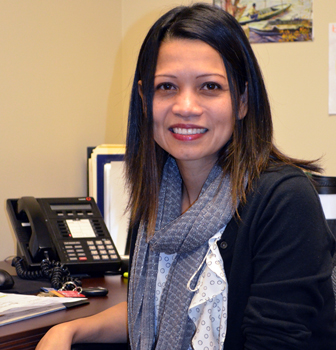Vigil raises awareness of local human trafficking concerns
The community and congregations can help anti-human trafficking efforts through awareness, donations, referrals and joining in efforts and events, said Mabel Elsom, anti-human trafficking coordinator with Lutheran Community Services Northwest (LCSNW) in Spokane.
 |
| Mabel Elsom, Anti-humanTrafficking Coordinator, LCSNW |
For Human Trafficking Awareness Month in January, LCSNW, as part of the Washington Anti-Trafficking Response Network (WARN), is planning a “Candlelight Vigil for Victims of Human Trafficking” at 5:30 p.m., Friday, Jan. 11, at the Women’s Hearth, 920 W. Second.
The vigil is an effort to raise awareness of local concerns.
In January, Whitworth University and Mt. Spokane High School students are helping distribute to public locations posters that say in six languages: “No one should force another person into work or prostitution. Victims of human trafficking have rights, regardless of their immigration status.” The posters have the national human trafficking hotline, 888-373-7888.
“People do not realize how hard it is for victims to leave their situations. It’s hard for them to come forward. When they do, we need to be able to provide services and housing. They have suffered and deserve our help. Victims are entitled to protection and assistance regardless of their immigration status,” said Mabel. “We also need to change the laws so there is more funding for services.”
As a child in El Salvador, Mabel said her parents warned her when she went out to walk to school or elsewhere that some people in vans steal and sell children.
Now she sees the other end of human trafficking, which has two forms in the region: labor trafficking and sex trafficking.
WARN says that labor trafficking uses force, fraud or coercion to recruit, harbor, transport, provide or obtain a person for labor or services in involuntary servitude, bound to service to repay a debt. In sexual exploitation, people are forced through fraud or coercion into commercial sex before the age of 18.
Lutheran Community Services Northwest, as part of the WARN coalition of non-governmental organizations provides comprehensive services and assistance to victims of trafficking, said Mabel.
Those services include 24-hour emergency response, interpretation services, food and safe housing, immigration and legal advocacy, physical and mental health treatment, education and job readiness training, and outreach and education to the public.
LCSNW also collaborates with the Coalition to Abolish Human Trafficking in the Inland Northwest and other organizations in the community.
In 1983, she left El Salvador and came to the San Francisco Bay area to live with her mother. She completed high school and earned a bachelor’s degree in psychology at California State University at Hayward in 1995.
Moving to Spokane that year, she worked at Excelsior Youth Center and then at Volunteers of America of the Inland Northwest, first as an individual and tailored-care coordinator with Breakthrough for Families, and then as manager of that program.
She has been attending Whitworth University and is close to completing her master’s degree in elementary education.
“From working with homeless teens, I realize life is a lesson: don’t give up, be resilient, patient and persevere. Life is a long journey. We have to keep the momentum going,” Mabel said.
Learning about trafficking here in 2005, she wanted to help.
After visiting El Salvador at the time of her father’s death in 2010, she returned to Spokane wanting to do something to make a change.
“I have a passion to help raise awareness of this awful crime. Victims need to know there is help available,” she said.
Mabel offers presentations on human trafficking to educate congregations, community groups, schools, colleges, law enforcement and nonprofit organizations.
“Some churches welcome hearing about human trafficking,” she said of her work to raise awareness among churches. “It’s an unpleasant topic, but we need to talk about it, because it happens.
“Awareness will help open doors so we can serve more people,” she said.
When victims of trafficking call the sexual assault and crime hotline in Spokane, they may not immediately recognize that they are victims.
“Their situations may be all they know,” Mabel said. “Denial is strong, because they rely on the trafficker for survival—food, shelter and clothing.”
Recently, she spoke with a 15-year-old boy in Seattle. He had left Guatemala and come to the United States illegally to help his family. He was kept locked in a small room with others. They eventually broke the door but didn’t know where to go.
“It breaks my heart. I know the U.S. is seen as the land of opportunity there,” she said.
Sometimes people pay to come to the United States, say $5,000, but are then told the cost was $10,000, so they think they must work to pay the trafficker back. They rarely know their rights nor ask for help.
Victims can call the hotline. Anyone can refer victims to LCSNW if they know the signs that someone is trafficked.
Signs of trafficking include an abusive work situation, an employer controlling an employee’s identification or immigration status, people locked in a residence or work place or an employee owing the employer a debt.
“Trafficking victims face challenges in coming forward, because they lack trust and worry about the consequences,” Mabel said.
“It is important to develop a trusting relationship with victims and help on their terms to ensure they feel safe and receive the support they need,” she explained.
“Sometimes the only thing I can do is pray,” Mabel said. “I believe in the power of prayer, so it’s one thing I do when someone is not ready.”
For information, call 343-5091 or email melsom@lcsnw.org.
See also community workshop announcement flyer, March 9, 2013
Copyright © January 2013 - The Fig Tree




